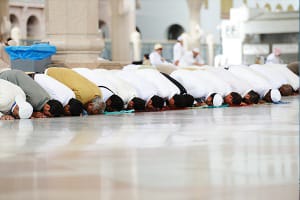The Five Pillars of Islam are the five basic acts of worship that are obligatory for all Muslims. These pillars provide a framework for Muslim life, guiding believers in their relationship with Allah and their fellow human beings. The 5 pillars of Islam in order are as follows:
Table of Contents
Building a Spiritual Structure and Exploring the Five Pillars of Islam as follows:
1. Shahada: The Declaration of Faith
The first pillar of Islam is the Shahada, which is the declaration of faith. It is a simple statement that affirms the oneness of Allah and the prophethood of Muhammad. The Shahada is recited by Muslims daily, and it is also recited during the conversion to Islam.
The Shahada is the most fundamental aspect of the Islamic faith. It affirms the oneness of Allah and the prophethood of Muhammad, and it serves as a reminder to Muslims of their commitment to Allah and their responsibilities as believers. The Shahada is recited during daily prayers, as well as during other important moments in Muslim life, such as marriage and funerals.
The Shahada is the most important and foundational aspect of the Islamic faith. It is a declaration of belief in the oneness of Allah and the prophethood of Muhammad, and it serves as a reminder to Muslims of their commitment to Allah and their responsibilities as believers. The Shahada is recited by Muslims daily, and it is also recited during the conversion to Islam.
The shahada in arabic is as follows: “La ilaha illallah muhammadur rasulullah ” (There is no god but Allah, and Muhammad is the messenger of Allah).
2. Salah: The five daily prayers

The second pillar of Islam is Salah, which is the five daily prayers. These prayers are performed facing the Kaaba in Mecca, and they are performed at specific times throughout the day: dawn, midday, afternoon, sunset, and night. Muslims are required to perform these prayers every day, and they serve as a reminder of the importance of Allah in their lives.
Salah is one of the most important pillars of Islam, and it serves as a reminder of the importance of Allah in a Muslim’s life. The five daily prayers are performed at specific times throughout the day, and they are meant to provide a regular connection between the believer and Allah. The performance of the prayers involves a specific set of movements and recitations, and they serve as a means of purifying the soul and increasing one’s devotion to Allah.
Salah is a daily act of devotion and worship in Islam. Muslims are required to perform five daily prayers facing the Kaaba in Mecca, at specific times throughout the day: dawn, midday, afternoon, sunset, and night. The performance of the prayers involves a specific set of movements and recitations, and they serve as a means of purifying the soul and increasing one’s devotion to Allah.
The five daily prayers in Islam are:
Fajr: The pre-dawn prayer, which is performed before sunrise.
Dhuhr: The midday prayer, which is performed after the sun has passed its zenith.
Asr: The afternoon prayer, which is performed in the late afternoon.
Maghrib: The evening prayer, which is performed just after sunset.
Isha: The night prayer, which is performed after the twilight has disappeared.
These five prayers are performed facing the Kaaba in Mecca and are an important part of a Muslim’s daily worship and connection with Allah.
3. Zakat: The giving of alms
The third pillar of Islam is Zakat, which is the giving of alms. Muslims who have wealth above a certain threshold are required to give 2.5% of their wealth to those in need. This is meant to help those who are less fortunate and to promote social justice.
Zakat is a form of charity that is required of all Muslims who have wealth above a certain threshold. It is meant to help those who are less fortunate, and it serves as a reminder of the importance of social responsibility and justice. The giving of Zakat is considered a form of worship, and it is believed to purify the wealth of the giver and increase their blessings.
Zakat is a form of obligatory charity that is required of all Muslims who have wealth above a certain threshold. It is meant to help those who are less fortunate, and it serves as a reminder of the importance of social responsibility and justice. The giving of Zakat is considered a form of worship, and it is believed to purify the wealth of the giver and increase their blessings.
Zakat is considered a form of worship, and it is believed to purify the wealth of the giver and increase their blessings.
4. Sawm: Fasting during Ramadan
The fourth pillar of Islam is Sawm, which is fasting during the month of Ramadan. Muslims are required to abstain from food and drink during daylight hours throughout the month of Ramadan, in order to focus on their spiritual and moral development.
Fasting during Ramadan is one of the most significant acts of worship in Islam. It involves abstaining from food, drink, and other physical needs during daylight hours throughout the month of Ramadan. Fasting is meant to promote self-discipline, self-control, and spiritual and moral development. It is also a reminder of the importance of mindfulness and compassion towards others.
Fasting during the month of Ramadan is a significant act of worship in Islam. Muslims are required to abstain from food, drink, and other physical needs during daylight hours throughout the month of Ramadan. Fasting is meant to promote self-discipline, self-control, and spiritual and moral development. It is also a reminder of the importance of mindfulness and compassion towards others.
Fasting during Ramadan is considered a form of worship, and it is believed to purify the soul and increase one’s piety.
5. Hajj: The pilgrimage to Mecca

The fifth pillar of Islam is Hajj, which is the pilgrimage to Mecca. Muslims who are physically and financially able to do so are required to make the pilgrimage to Mecca at least once in their lifetime. The Hajj is performed during the Islamic month of Dhul-Hijjah, and it involves a series of rituals, including circumambulating the Kaaba, standing on the plains of Arafat, and sacrificing an animal.
The Hajj is one of the most important pillars of Islam, and it involves a journey to Mecca, the holiest city in Islam. The Hajj is performed during the Islamic month of Dhul-Hijjah, and it involves a series of rituals, including circumambulating the Kaaba, standing on the plains of Arafat, and sacrificing an animal. The Hajj is a reminder of the importance of unity and brotherhood in the Muslim community, and it is believed to bring great spiritual and moral benefits to the pilgrim.
The Hajj is a pilgrimage to the holy city of Mecca that is required of all Muslims who are physically and financially able to make the journey. The Hajj is performed during the Islamic month of Dhul-Hijjah, and it involves a series of rituals, including circumambulating the Kaaba, standing on the plains of Arafat, and sacrificing an animal. The Hajj is a reminder of the importance of unity and brotherhood in the Muslim community, and it is believed to bring great spiritual and moral benefits to the pilgrim.
The Hajj is considered a form of worship, and it is believed to bring great spiritual and moral benefits to the pilgrim.
conclusion
, the Five Pillars of Islam provide a foundation for Muslim life, guiding believers in their relationship with Allah and their fellow human beings. Through the declaration of faith, the daily prayers, the giving of alms, fasting during Ramadan, and the pilgrimage to Mecca, Muslims seek to fulfill their spiritual and moral obligations and draw closer to Allah. These pillars serve as a constant reminder of the importance of devotion, self-discipline, and social responsibility in the Islamic faith.
The Five Pillars of Islam provide a framework for Muslim life, guiding believers in their relationship with Allah and their fellow human beings. Through the declaration of faith, the five daily prayers, the giving of alms, fasting during Ramadan, and the pilgrimage to Mecca, Muslims seek to fulfill their spiritual and moral obligations and draw closer to Allah.
The Shahada is the most fundamental aspect of the Islamic faith, affirming the oneness of Allah and the prophethood of Muhammad. Salah is a daily act of devotion and worship, providing a regular connection between the believer and Allah. Zakat is a form of obligatory charity that promotes social responsibility and justice. Sawm is a significant act of worship, promoting self-discipline, self-control, and spiritual and moral development. The Hajj is a pilgrimage to the holy city of Mecca, promoting unity, brotherhood, and spiritual and moral awareness.
Overall, the Five Pillars of Islam provide a foundation for Muslim life, guiding believers in their relationship with Allah and their fellow human beings. By fulfilling these pillars, Muslims seek to deepen their faith, increase their devotion to Allah, and promote social responsibility and justice. The Five Pillars serve as a constant reminder of the importance of devotion, self-discipline, and social responsibility in the Islamic faith.
you may like to read about
- Taraweeh prayer and dua of taraweeh!
- How to read Quran with Tajweed
- Importance of Ramadan 10 facts about Ramadan
FAQS
How is prayer important?
Prayer is one of the most important acts of worship in Islam, and it is considered a fundamental aspect of a Muslim’s relationship with Allah. Here are some reasons why prayer is important in Islam:
1. It is a direct means of communication with Allah: Prayer is a direct means of communication with Allah, and it allows Muslims to establish a personal relationship with their Creator. Through prayer, Muslims express their gratitude, seek forgiveness, and ask for guidance and blessings.
2. It serves as a reminder of the importance of Allah in a Muslim’s life: By performing the five daily prayers, Muslims are reminded of the importance of Allah in their lives. The prayers serve as a regular connection between the believer and Allah, and they serve as a means of purifying the soul and increasing one’s devotion to Allah.
3. It promotes discipline and self-control: Prayer requires Muslims to be disciplined and self-controlled, as they must perform the prayers at specific times throughout the day, regardless of their other obligations. This promotes self-discipline and self-control, and it serves as a reminder of the importance of mindfulness and devotion in all aspects of life.
4. It creates a sense of community: Prayer is often performed in congregation, particularly on Fridays, and it creates a sense of community and brotherhood among Muslims. By praying together, Muslims are reminded of their shared faith and the importance of supporting one another in their spiritual journeys.
5. It provides numerous spiritual and moral benefits: Prayer is believed to bring numerous spiritual and moral benefits to the believer, including increased piety, self-awareness, and humility. It is also believed to protect against evil and to bring peace and tranquility to the soul.
Overall, prayer is a cornerstone of the Islamic faith, and it is considered one of the most important acts of worship in Islam. By establishing a direct connection with Allah, promoting discipline and self-control, creating a sense of community, and providing numerous spiritual and moral benefits, prayer plays a crucial role in the spiritual and moral development of Muslims.
Salah consists of a specific set of movements and recitations, including standing, bowing, prostrating, and reciting verses from the Quran.
What is the punishment of leaving the prayer?
In Islam, prayer is one of the most important acts of worship, and it is considered obligatory for all Muslims. The punishment for leaving the prayers, also known as “Salah”, is a matter of Islamic jurisprudence and is subject to interpretation by Islamic scholars.
However, in general, the punishment for intentionally and persistently abandoning the Salah is considered a major sin in Islam, and it is believed to have serious consequences in both this life and the hereafter. The severity of the punishment is based on the level of intention and the frequency of the abandonment of the prayers.
Here are some of the potential consequences of leaving the prayers in Islam:
The loss of Allah’s protection: By abandoning the Salah, a Muslim may lose the protection and guidance of Allah, making them more vulnerable to negative influences and temptations.
The weakening of the faith: Leaving the prayers can weaken a Muslim’s faith and commitment to Allah, making them more susceptible to sin and disobedience.
The potential for spiritual damage: Leaving the prayers can cause spiritual damage to the soul, leading to a sense of emptiness and disconnection from Allah.
The possibility of punishment in the hereafter: Muslims who intentionally and persistently abandon the Salah may face punishment in the hereafter, which can be severe.
While the exact punishment for leaving the prayers is a matter of Islamic jurisprudence and interpretation, it is clear that abandoning the Salah is considered a major sin in Islam with serious consequences. Therefore, it is important for Muslims to fulfill their obligation to pray and to seek forgiveness if they have fallen short in this regard.
What are some of the benefits of praying regularly?
Praying regularly has numerous benefits for Muslims, both spiritually and psychologically. Here are some of the benefits of praying regularly in Islam:
Strengthening the relationship with Allah: Prayer is a direct means of communication with Allah, and it allows Muslims to establish and strengthen their relationship with their Creator. Through prayer, Muslims can express their gratitude, seek forgiveness, and ask for guidance and blessings.
Increasing mindfulness and focus: Prayer requires Muslims to be present in the moment and to focus on their connection with Allah, which can increase mindfulness and focus in other areas of life.
Promoting discipline and self-control: Praying regularly requires discipline and self-control, as Muslims must perform the prayers at specific times throughout the day, regardless of their other obligations. This promotes self-discipline and self-control, and it serves as a reminder of the importance of mindfulness and devotion in all aspects of life.
Providing a sense of peace and tranquility: Prayer can provide a sense of peace and tranquility to the soul, as Muslims seek refuge in Allah and find solace in their relationship with Him.
Creating a sense of community: Praying in the congregation can create a sense of community and brotherhood among Muslims, as they come together in worship and support one another in their spiritual journeys.
Increasing gratitude and positivity: Prayer can increase gratitude and positivity, as Muslims reflect on the blessings in their lives and seek Allah’s guidance and protection.
Improving mental health: Regular prayer has been shown to have numerous mental health benefits, including reducing stress, anxiety, and depression.
Overall, praying regularly has numerous benefits for Muslims, both spiritually and psychologically. By strengthening the relationship with Allah, increasing mindfulness and focus, promoting discipline and self-control, providing a sense of peace and community, and improving mental health, prayer plays a crucial role in the spiritual and psychological well-being of Muslims.
What is the purpose of the Hajj?
The purpose of the Hajj is to fulfill one of the Five Pillars of Islam and to strengthen the faith and devotion of the pilgrim. The Hajj is a journey to the holy city of Mecca, which is the birthplace of the Prophet Muhammad (peace be upon him) and the site of the Kaaba, the most sacred site in Islam. The Hajj is a time for Muslims from all over the world to come together in unity and brotherhood, to seek forgiveness for their sins, and to renew their commitment to Allah.
The Hajj has several purposes, including:
1. To fulfill a religious obligation: The Hajj is one of the Five Pillars of Islam, and it is a religious obligation for all Muslims who are physically and financially able to make the journey. By performing the Hajj, Muslims fulfill this important obligation and demonstrate their devotion and submission to Allah.
2. To seek forgiveness for sins: The Hajj is a time for Muslims to seek forgiveness for their sins and to purify themselves spiritually. The rituals of the Hajj are meant to remind the pilgrim of their relationship with Allah and to help them reflect on their moral and spiritual responsibilities.
3. To strengthen the bond of brotherhood and sisterhood: The Hajj is a time for Muslims from all over the world to come together in unity and brotherhood, regardless of their race, nationality, or social status. The Hajj serves as a reminder of the importance of unity and solidarity in the Muslim community.
4. To remember the legacy of the Prophet Ibrahim (peace be upon him): The Hajj is also a time to remember the legacy of the Prophet Ibrahim (peace be upon him), who is considered the father of the monotheistic faiths. Many of the rituals of the Hajj are based on the actions of Prophet Ibrahim and his family, including the circumambulation of the Kaaba and the sacrifice of an animal.
Overall, the purpose of the Hajj is to fulfill a religious obligation, to seek forgiveness for sins, to strengthen the bond of brotherhood and sisterhood, and to remember the legacy of the Prophet Ibrahim. The Hajj is a time for Muslims to renew their commitment to Allah and to their fellow human beings, and to come away with a deeper sense of spiritual and moral awareness.







